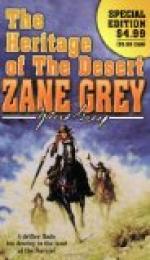Naab pulled on the reins, and pointed to one side. Hare discerned three grayish sharp-nosed beasts sneaking off in the sage, and he reached back for the rifle. Naab whistled, stopping the coyotes; then Hare shot. The ball cut a wisp of dust above and beyond them. They loped away into the sage.
“How that rifle spangs!” exclaimed Naab. “It’s good to hear it. Jack, you shot high. That’s the trouble with men who have never shot at game. They can’t hold low enough. Aim low, lower than you want. Ha! There’s another—this side—hold ahead of him and low, quick!—too high again.”
It was in this way that August and Hare fell far behind the other wagons. The nearer Naab got to his home the more genial he became. When he was not answering Hare’s queries he was giving information of his own accord, telling about the cattle and the range, the mustangs, the Navajos, and the desert. Naab liked to talk; he had said he had not the gift of revelation, but he certainly had the gift of tongues.
The sun was in the west when they began to climb a ridge. A short ascent, and a long turn to the right brought them under a bold spur of the mountain which shut out the northwest. Camp had been pitched in a grove of trees of a species new to Hare. From under a bowlder gushed the sparkling spring, a grateful sight and sound to desert travellers. In a niche of the rock hung a silver cup.
“Jack, no man knows how old this cup is, or anything about it. We named the spring after it—Silver Cup. The strange thing is that the cup has never been lost nor stolen. But—could any desert man, or outlaw, or Indian, take it away, after drinking here?”
The cup was nicked and battered, bright on the sides, moss-green on the bottom. When Hare drank from it he understood.
That evening there was rude merriment around the campfire. Snap Naab buzzed on his jews’-harp and sang. He stirred some of the younger braves to dancing, and they stamped and swung their arms, singing, “hoya-heeya-howya,” as they moved in and out of the firelight.
Several of the braves showed great interest in Snap’s jews’-harp and repeatedly asked him for it. Finally the Mormon grudgingly lent it to a curious Indian, who in trying to play it went through such awkward motions and made such queer sounds that his companions set upon him and fought for possession of the instrument. Then Snap, becoming solicitous for its welfare, jumped into the fray. They tussled for it amid the clamor of a delighted circle. Snap, passing from jest to earnest, grew so strenuous in his efforts to regain the harp that he tossed the Navajos about like shuttle-cocks. He got the harp and, concealing it, sought to break away. But the braves laid hold upon him, threw him to the ground, and calmly sat astride him while they went through his pockets. August Naab roared his merriment and Hare laughed till he cried. The incident was as surprising to him as it was amusing. These serious Mormons and silent Navajos were capable of mirth.




